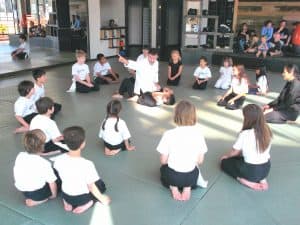
The Truth
Martial arts has long been touted as a powerful tool for teaching kids all kinds of skills and traits, from discipline and confidence to partner skills and self defense. Some martial arts teachers with less experience have a difficult time actually instilling these values. Instead, they spend most of their time just trying to keep their class under control (I can sympathize with these teachers on some days), and thus end up more or less giving lip service to the idea.
Many parents, like mine, grow impatient along with their in the early stages of martial arts practice. It’s understandable. You want what’s best for your child, and you want them to be as happy as possible as often as possible. Well as we find out, these two things don’t always go hand-in-hand. Even at our school, which has a very experienced and engaging teacher at the helm (if I do say so myself), many students encounter a rough patch in the first few months. They feel like they aren’t getting it fast enough, or they get bored. Are we really that surprised that our kids complain when we tell them they have to put down their video game?
Trouble happens when the attitude towards practice (for adult students as well) is more like, “I’ll do it until I’m no longer entertained.” Martial arts is education, not entertainment. While it is exciting and incredibly rewarding, it isn’t easy. And it isn’t fun in the same way that goofing off in a playground is fun. In our school, we say martial arts is serious fun. It’s fun in the same way that building something substantial is fun, or learning a language and then being able to really speak it. The effort, the hard work that leads to a bigger payoff is a necessity. If a student isn’t being challenged, they won’t truly grow, and they aren’t really practicing martial arts.
The Miracle
Real martial arts, taught well, will have an incredibly enriching influence on your child. But you have to give it a chance.
When parents make the decision early on that their son or daughter is going to practice martial arts, even when they don’t feel like it that day or that week or that month, things become very simple. There is no question of whether or not a student is going to class, and that takes all the stress out of the situation. They know they are going to the dojo, and they know they are going to work hard. Simple.
Fairly quickly, a student begins to feel like they belong at the school. They learn the etiquette. The uplifting attitude of others in class begins to rub off on them. A kid starts feeling physically stronger, and over time, they will become mentally stronger. Self defense is a nice bonus, but that comes more as an early consequence. Through hard work and motivation, a student will start to recognize that their effort pays off. They learn the value of patience, concentration and discipline. This is where real confidence is fostered. For me, this has been one of the most important lessons martial arts taught me. When I try hard, I get results. This is what turned me from an abysmal academic student into one who got straight A’s. This was the first time I really understood that I was in control of how my life would go. I could make it ordinary, or I could make it great. So I went to work.


